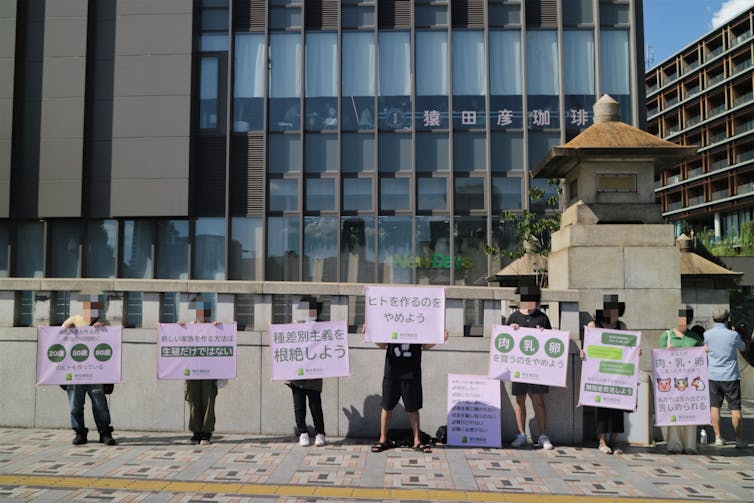
Iryna Tolmachova/iStock via Getty Images Plus
In the first few days after Donald Trump’s election in November 2024, purchases of emergency contraceptives spiked, with two companies reporting sales about 1,000% higher than the preceding week. Meanwhile, Planned Parenthood reported a 760% increase in appointments for IUDs the day after his win.
Many Americans are fearful that the incoming administration could further curb reproductive rights, 2½ years after the U.S. Supreme Court overturned the constitutional right to abortion. Today, roughly one-third of states ban the procedure almost entirely or after the first 6 weeks of pregnancy – before many women and girls realize that they’re pregnant.
Several nominees for Trump’s second administration oppose abortion rights. But some of his allies have suggested that not having children is itself a moral failing.
In a 2019 speech, for example, Vice President-elect JD Vance said that people “become more attached to their communities, to their families, to their country because they have children.” In 2021, he tweeted that low birth rates “have made many elites sociopaths.” During a Trump rally in 2024, Arkansas Gov. Sarah Huckabee Sanders said her children are a “permanent reminder of what’s important” and “keep me humble.” Kamala Harris – who has two stepchildren, but no biological children – “doesn’t have anything keeping her humble,” Sanders said.
Beyond politics, many people hold similar views. People from New York Times columnist Ross Douthat to Pope Francis have described decreasing birth rates as a sign of self-centered cultures.
Plenty of childless people want children but can’t have them. Other people may not want kids for personal or economic reasons. But advocates for “anti-natalism,” a relatively new social movement, argue giving birth is immoral. The anti-natalists I’ve interviewed push back against the idea that childlessness is selfishness. They believe they are protecting their unborn children, not neglecting them: that childlessness is the ethical choice.

Asagi Hozumi
Then and now
In the 1970s, the word “anti-natalism” referred to policies designed to reduce a country’s fertility rate, such as the campaign to sterilize millions of men in India during the state of emergency from 1975-1977. Such policies were designed to address concerns of overpopulation and poverty, spurred in part by growing environmental awareness.
In the following decades, niche environmental movements such as the Voluntary Human Extinction Movement were influenced by this trend and encouraged people to stop having children for the sake of the planet.
However, anti-natalism first came to denote a moral philosophy in 2006, when two key books were published: “The Art of Guillotining Procreators,” by Belgian activist Théophile de Giraud, and “Better Never to Have Been,” by South African philosopher David Benatar.
Rather than emphasize the damage new humans cause to the planet, this new anti-natalism emphasizes the harm life brings to the unborn. By not having children, these philosophers argue, people help the unborn avoid the inherent painfulness of life. The unborn cannot experience life’s pleasures, either – but as Benatar writes, “those who never exist cannot be deprived.”
Anti-natalism took off among a collection of online communities but reached a broader audience in 2019, when Raphael Samuel, a Mumbai businessman, attempted to sue his parents for giving birth to him without his consent. The stunt sparked public conversation about the ethics of procreation and prompted the formation of the activist group Childfree India.
Various anti-natalist groups have formed across the globe since, including a subreddit with about 230,000 members. Stop Having Kids, founded in the U.S. in March 2021, has hosted demonstrations spanning Canada, Bangladesh and Poland. That same year, Asagi Hozumi and Yuichi Furuno created Antinatalism Japan and have been holding frequent outreach events in Tokyo since 2023. In early 2024, an Israeli activist named Nimrod Harel planned a European tour to promote anti-natalism in more than 30 cities.

Stake in the future
Criticism of anti-natalists comes in many different flavors. Most frequently, however, anti-natalists complain that they are called selfish: that critics assume they are prioritizing their own freedom over raising the next generation. “I never understood people who say ‘not having children is selfish,’” one anti-natalist wrote in their community group chat. “Name me one reason you are (having children) for the child’s sake.”
Deciding not to have children can be motivated by a desire for freedom and self-actualization, but it doesn’t have to be. Often, among the anti-natalist online communities I study, the point of not having children is precisely to protect them.
Shyama, an anti-natalist from Bengaluru, India, used to teach low-income children. After witnessing the effects of the COVID-19 pandemic on her students, she hopes to pivot toward a career in mental health research for children and adolescents.
She speaks about her own children, but only in hypothetical terms, having vowed not to have kids. When she reads about bad news, she feels relieved that her children never have to suffer like that. She refuses birth for their sake. When her friends accused her of challenging other people’s right to have a child, she told me that “this was less unfair than bringing another life into this world and imposing an entire lifetime of inevitable suffering on it.”
Some critics respond that having children gives parents a stake in the future. Philosopher Samuel Scheffler, for instance, argues that having children personalizes the future, anchoring parents to a community that extends beyond their own lifetimes.

Uwe Krejci/DigitalVision via Getty Images
Anti-natalists, however, refuse to equate children with a stake in the future. Anugraha Kumar, a Marxist anti-natalist, told me that most leaders within the Communist Party of India are childless. Without needing to support a family, they are free to fight for a better future.
Secularizing birth
Throughout history, catastrophic events have provoked reflection about the ethics of reproduction. After the Holocaust and the atomic bombing of Hiroshima and Nagasaki, Jewish and Japanese writers documented some survivors’ apprehensions about giving birth. According to anthropologist Jade Sasser, anxieties about climate change, the economy and political turmoil have fueled current questions about whether to have a family.
But I have argued that this narrative downplays deeper shifts in how many modern societies understand birth.
Traditionally, birth was often considered entwined with religion: something predestined, or even shaped by divine intervention. In many of the societies where anti-natalist groups have formed, however, parents have far more control over whether to give birth, when and to whom – and birth is viewed in a more secular way.
Birth is less often viewed as part of divine order but often likened to a lottery: a game of chance where parents roll the die and their children suffer the consequences. Japanese anti-natalists, for example, sometimes compare their birth to “gachapon”: vending machines that spit out a toy at random each time someone inserts money.
Parents choose to “spin the wheel of life,” an anti-natalist from Philadelphia told me, without knowing what kind of life they will create. Without a way to acquire consent from the unborn, he added, “This is not a risk that is ours to take.”![]()
Jack Jiang, PhD Student in Anthropology, The New School
This article is republished from The Conversation under a Creative Commons license. Read the original article.

























































